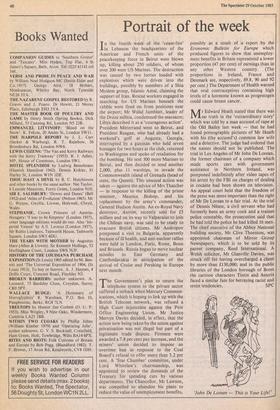Portrait of the week
n the fourth week of the 'cease-fire' 1 in Lebanon the headquarters of the American and French units of the peacekeeping force in Beirut were blown up, killing about 250 soldiers, of whom over 200 were US Marines. The destruction was caused by two lorries loaded with explosives which were driven into the buildings, possibly by members of a Shia Moslem group, Islamic Amal, claiming the support of Iran. Rescue workers engaged in searching for US Marines beneath the rubble were fired on from positions near the airport; Mr Walid Jumblatt, leader of the Druze militia, condemned the massacre; Libya described it as a 'courageous action', President Mitterrand went to Beirut, and President Reagan, who had already had a weekend's golf at Augusta, Georgia, interrupted by a gunman who held seven hostages for two hours at the club, returned to Washington and spoke of retaliation for the bombing. He sent 300 more Marines to Beirut, and then decided to send another 2,000, plus .11 warships, to invade the Commonwealth island of Grenada (head of state, the Queen). This unusual action was taken — against the advice of Mrs Thatcher — in response to the killing of the prime minister, Maurice Bishop, and his replacement by the army's commander, General Hudson Austin. An ex-Royal Navy destroyer, Antrim, recently sold for £5 million and on its way to Valparaiso to join the Chilean navy, was said to be ready to evacuate British citizens. Mr Andropov postponed a visit to Bulgaria, apparently because of ill health, and anti-nuclear rallies were held in London, Paris, Rome, Bonn and Brussels. Russia began to move nuclear missiles to East Germany and Czechoslavakia in anticipation of the arrival of Cruise and Pershing in Europe next month.
The Government's plan to return the telephone system to the private sector suffered a setback when Mercury Commun- ications, which is hoping to link up with the British Telecom network, was refused a High Court injunction against the Post Office Engineering Union. Mr Justice Mervyn Davies decided, in effect, that the action now being taken by the union against privatisation was not illegal but part of a legitimate trade dispute. Firemen were awarded a 7.8 per cent pay increase, and the miners' union decided to impose an overtime ban in response to the Coal Board's refusal to offer more than 5.2 per cent. A 'Star Chamber' committee, under Lord Whitelaw's chairmanship, was appointed to review the demands of the Treasury for spending cuts by various departments. The Chancellor, Mr Lawson, was compelled to abandon his plans to reduce the value of unemployment benefits,
possibly as a result of a report by the Economic Bulletin for Europe which produced figures to show that unemploy- ment benefits in Britain represented a lower proportion (47 per cent) of earnings than in any other Western country. (The proportions in Ireland, France and Denmark are, respectively, 89.8, 90 and 92 per cent.) The Department of Health warned that oral contraceptives containing high levels of a hormone known as progestogen could cause breast cancer.
Mr Edward Heath stated that there was no truth in the 'extraordinary story' which was told by a man accused of rape at the Old Bailey last week — that he had found pornographic pictures of Mr Heath with his (the accused's) common law wife and a detective. The judge had ordered that the names should not be published. The trial in Los Angeles of Mr John De Lorean, the former chairman of a company which made sports cars with government assistance in Northern Ireland, was postponed indefinitely after video tapes of his arrest by the FBI on charges of dealing in cocaine had been shown on television. An appeal court held that the freedom of the press was more important than the right of Mr De Lorean to a fair trial. At the trial of Dennis Nilsen, a civil servant who had formerly been an army cook and a trainee police constable, the prosecution said that he had told the police he had killed 16 men. The chief executive of the Abbey National building society, Mr Clive Thornton, was appointed chairman of Mirror Group Newspapers, which is to be sold by its parent company, Reed International. A Welsh solicitor, Mr Glanville Davies, was struck off for having overcharged a client by more than £130,000; and in the public libraries of the London borough of Brent the cartoon characters Tintin and Asterix faced a similar fate for betraying racist and
'John De Lorean — This is Your Life














































 Previous page
Previous page